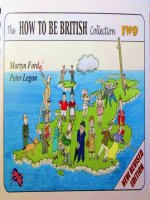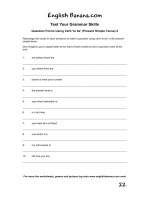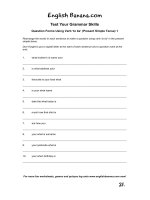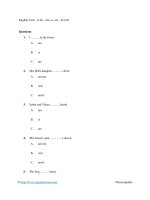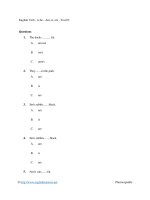34971 the verb to be present simple
Bạn đang xem bản rút gọn của tài liệu. Xem và tải ngay bản đầy đủ của tài liệu tại đây (242.97 KB, 2 trang )
Mark has got a broken leg. He must stay at home. He can read and
write and he can play cards. But, unfortunately he can´t run. He can´t
ride his bike and he can´t go to school.
Answer the questions.
What‘s the matter with Mark?
What can Mark do?
What can’t he do?
1-…………………………………….
2-…………………………………………
3-…………………………………………
Observe
He can read and write. He can play cards
He can’t run and ride his bike.He can’t go to school
B) Label the pictures with the words in
the box.
1. swimming
2. basketball
3. skating
4. surf
5. running
6. tennis
7. football
8. climbing
9. sailing
10. boxing
11. parachute jumping
12. weight lifting
+ stem
+ stem
Affirmative
Negative
Interogative
I can …
You can…
He can…
She can …
It can ….
We can …
You can…
They can…
I can’t …
You can’t …
He can’t …
She can’t …
It can’t …
We can’t …
You can’t …
They can’t …
Can I.....?
Can you.....?
Can he.... ?
Can she ...?
Can it......?
Can we.......?
Can you .....?
Can they...?
A) Look at the pictures again and write
sentences with can and can´t .
Example: He can play football but he can´t
swim.
•
•
•
•
•
•
•
•
•
__________________________
__________________________
__________________________
__________________________
__________________________
__________________________
__________________________
__________________________
__________________________
•
•
Can expresses ability or capacity.
Can is called a modal verb. It always keeps the same form in
the present.
E.g.: He can run fast.
